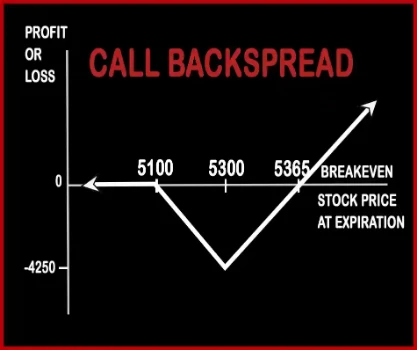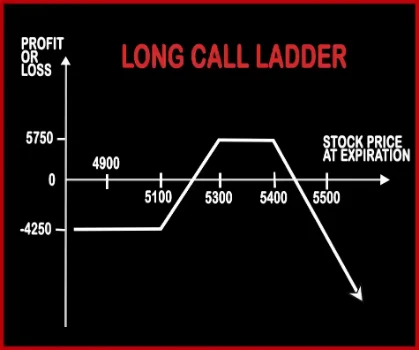Compare Strategies
| CALL BACKSPREAD | LONG CALL LADDER | |
|---|---|---|

|

|
|
| About Strategy |
Call Backspread Option Trading This strategy is adopted by traders who are bullish in nature. He expects market and volatility to rise in the near future. A trader need not be direction specific here (i.e. an upward or downward trend, but a small bias towards an uptrend should always be present, as the gains will be much higher once the market moves up r |
Long Call Ladder Option StrategyLong Call Ladder Strategy is an extension to Bull Call Spread Strategy. A trader will be slightly bullish about the market, in this strategy but bearish over volatility. It involves buying of an ITM Call Option and sale of 1 ATM & 1 OTM Call Options. However, the risk associated with this strategy is unlimited and reward is limited. |
CALL BACKSPREAD Vs LONG CALL LADDER - Details
| CALL BACKSPREAD | LONG CALL LADDER | |
|---|---|---|
| Market View | Bullish | Neutral |
| Type (CE/PE) | CE (Call Option) | CE (Call Option) |
| Number Of Positions | 3 | 3 |
| Strategy Level | Advance | Advance |
| Reward Profile | Unlimited | Unlimited |
| Risk Profile | Limited | Unlimited |
| Breakeven Point | Lower breakeven = strike price of the short call, Upper breakeven = strike price of long calls + point of maximum loss | Upper Breakeven Point = Total Strike Prices of Short Calls - Strike Price of Long Call - Net Premium Paid, Lower Breakeven Point = Strike Price of Long Call + Net Premium Paid |
CALL BACKSPREAD Vs LONG CALL LADDER - When & How to use ?
| CALL BACKSPREAD | LONG CALL LADDER | |
|---|---|---|
| Market View | Bullish | Neutral |
| When to use? | This strategy is used when the investor expects the price of the stock to rise in the future. | This Strategy is an extension to Bull Call Spread Strategy. A trader will be slightly bullish about the market, in this strategy but bearish over volatility. |
| Action | Sell 1 ITM Call, BUY 2 OTM Call | Buy 1 ITM Call, Sell 1 ATM Call, Sell 1 OTM Call |
| Breakeven Point | Lower breakeven = strike price of the short call, Upper breakeven = strike price of long calls + point of maximum loss | Upper Breakeven Point = Total Strike Prices of Short Calls - Strike Price of Long Call - Net Premium Paid, Lower Breakeven Point = Strike Price of Long Call + Net Premium Paid |
CALL BACKSPREAD Vs LONG CALL LADDER - Risk & Reward
| CALL BACKSPREAD | LONG CALL LADDER | |
|---|---|---|
| Maximum Profit Scenario | Unlimited profit potential if the stock goes in upward direction. | Strike Price of Lower Strike Short Call - Strike Price of Long Call - Net Premium Paid - Commissions Paid |
| Maximum Loss Scenario | Strike Price of long call - Strike Price of short call - Net premium received | Price of Underlying - Upper Breakeven Price + Commissions Paid |
| Risk | Limited | Unlimited |
| Reward | Unlimited | Unlimited |
CALL BACKSPREAD Vs LONG CALL LADDER - Strategy Pros & Cons
| CALL BACKSPREAD | LONG CALL LADDER | |
|---|---|---|
| Similar Strategies | - | Short Strangle (Sell Strangle), Short Straddle (Sell Straddle) |
| Disadvantage | • Unlimited risk. • Margin required. | |
| Advantages | • Unlimited profit potential. | • Reduces capital outlay of bull call spread. • Wider maximum profit zone. • When there is decrease in implied volatility, this strategy can give profit. |